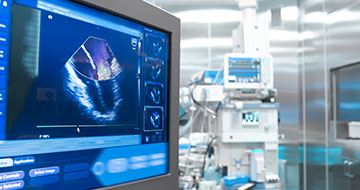Cardiology
The first step in your care process is to understand the nature of your disease so that we can diagnose your condition.
Cardiac Electrophysiology, is the study of the electrical activities of the heart, specifically for the purposes of diag...
When our patients present with problems that may be cardiovascular in nature, we help determine the most likely diagnosi...
When the heart is functioning normally, the arteries are clear and open to allow for easy passage of blood through and o...
We help our patients improve blood flow in their arteries and veins by using very small tubes and specialized tools to d...
The highly trained surgeons and specialists at Carondelet Medical Group diagnose and treat structural heart disease. We ...
{{SearchTerm}}
Seek immediate medical attention if you are experiencing this symptom.
We didn’t find an exact match for your request. Here are others to consider:
The closest doctor is {{ ClosestMiles }} miles away.
There are no results within {{ SelectedMiles }} miles of your location. Please find closest below:
Physician specialty matches Doctor Results for {{ SearchTerm }}{{ CommonSearchTermValue }}{{ BySpecialties }} near {{ ByZipCode }}
{{Title}}
{{physician.FirstName}} {{physician.LastName}}, {{physician.Title}}
{{PrintSpecialties(physician.Specialties, "Name")}}

miles
{{addressInfo(physician.Addresses, 0, "Group")}}
- {{addressInfo(physician.Addresses, 0, "Address1")}}
- {{addressInfo(physician.Addresses, 0, "Address2")}}
- {{addressInfo(physician.Addresses, 0, "City")}}{{VueFilterInfo(physician.Addresses,0,'State') ? ',' : '' }} {{addressInfo(physician.Addresses, 0, "State")}} {{addressInfo(physician.Addresses, 0, "Zip")}}
Your selected filters found no results. Please adjust your filter selection.
Please Wait Details Loading.
{{PhysicianDetails.FirstName}} {{PhysicianDetails.LastName}}, {{PhysicianDetails.Title}}
{{ PrintSpecialties(PhysicianDetails.Specialties, "Name")}}
Primary Location
{{ addressInfo(PhysicianDetails.Addresses, 0, "Group")}}
- {{addressInfo(PhysicianDetails.Addresses, 0, "Address1")}}
- {{addressInfo(PhysicianDetails.Addresses, 0, "Address2")}}
- {{addressInfo(PhysicianDetails.Addresses, 0, "City")}}{{VueFilterInfo(PhysicianDetails.Addresses,0,'State') ? ',' : '' }} {{addressInfo(PhysicianDetails.Addresses, 0, "State")}} {{addressInfo(PhysicianDetails.Addresses, 0, "Zip")}}
Languages Spoken
{{item.Name}}
Gender
{{PhysicianDetails.Gender === "M" ? "Male" : "Female"}}
About {{PhysicianDetails.FirstName}} {{PhysicianDetails.LastName}}, {{PhysicianDetails.Title}}
{{ SliceAboutMe(PhysicianDetails.AboutMe) }}
Read more about {{PhysicianDetails.FirstName}} {{PhysicianDetails.LastName}}, {{PhysicianDetails.Title}} Read less about {{PhysicianDetails.FirstName}} {{PhysicianDetails.LastName}}, {{PhysicianDetails.Title}}
- {{item.Name}}
-
{{item.Name}}
-
{{item.Name}}
The following insurance plans may be accepted by this provider. Please contact the provider's office directly to confirm insurance plans accepted.
Please contact this provider's office directly to determine insurance plans accepted.
- {{item.Payor}}
- {{item.Name}}
- {{item.Type == 'F' ? 'Fellowship' : ''}}{{item.Type == 'M' ? 'Medical School' : ''}}{{item.Type == 'I' ? 'Internship' : ''}}{{item.Type == 'R' ? 'Residency' : ''}}: {{item.Description}}
Patient Comments
Primary Location
{{addressInfo(PhysicianDetails.Addresses, 0, "Group")}}
- {{addressInfo(PhysicianDetails.Addresses, 0, "Address1")}}
- {{addressInfo(PhysicianDetails.Addresses, 0, "Address2")}}
- {{addressInfo(PhysicianDetails.Addresses, 0, "City")}}{{VueFilterInfo(PhysicianDetails.Addresses,0,'State') ? ',' : '' }} {{addressInfo(PhysicianDetails.Addresses, 0, "State")}} {{addressInfo(PhysicianDetails.Addresses, 0, "Zip")}}
Languages Spoken
{{item.Name}}
Gender
{{PhysicianDetails.Gender === "M" ? "Male" : "Female"}}
Where to Find {{PhysicianDetails.FirstName}} {{PhysicianDetails.LastName}}, {{PhysicianDetails.Title}}
#ResourceNotFound: PhysicianFinderResources, Miles2#
{{plocation.Group}}
- {{plocation.Address1}}
- {{plocation.Address2}}
- {{plocation.City}}{{plocation.State ? ',' : '' }} {{plocation.State}} {{plocation.Zip}}
What is Coronary Artery Disease?
Coronary artery disease (CAD) is the most common type of heart disease, affecting one in 20 adults aged 20 and above. CAD occurs when plaque or cholesterol-containing deposits build up in the inner walls of the coronary arteries over time.
The coronary arteries are major blood vessels that supply blood to the heart. With CAD, these arteries narrow and harden, decreasing or potentially blocking blood flow to the heart. This may cause your heart to not receive the amount of blood, nutrients and oxygen it needs to function optimally. In severe cases of CAD, the heart muscle dies due to a lack of blood flow, resulting in a heart attack.
The build-up of plaque may be attributed to poor lifestyle habits such as smoking and obesity, but it can also be caused by things that cannot be avoided, such as aging or a family history of heart disease.
Common Symptoms of CAD
People may feel heart disease symptoms during periods of stress, physical activity or rest. It is more common to experience these symptoms while walking, going upstairs or moving around.
If you feel any of the following CAD symptoms, seek help from a healthcare provider immediately.
- Chest pain or pressure (angina)
- Fatigue
- Shortness of breath
- Sudden and profuse sweating
Diagnosing Coronary Artery Disease
Heart diseases, like CAD, can affect a person silently, meaning someone may not experience symptoms until they have a serious health problem, such as a heart attack. This is why it is important to work alongside a trusted healthcare provider to evaluate your health status.
Regular check-ups can help your doctor assess your risk. At a check-up, your doctor will ask about any symptoms you have and how long you’ve been experiencing them. They will also ask about your medical history, family medical history, current lifestyle and any medications you’re taking.
If needed, your doctor may also order tests to review your:
- Blood pressure
- Body mass index (BMI)
- Blood and cholesterol levels
These tests may provide a clearer picture of what is happening inside your body and help you receive an accurate diagnosis.
If you are found to be at risk for CAD, a doctor may recommend lifestyle changes to prevent CAD. Your doctor may also order other diagnostic and imaging tests to fully understand the state of your heart.
What Questions Should I Ask My Heart Doctor?
If you have certain risk factors or are experiencing common CAD symptoms, schedule an appointment with a doctor for proper diagnosis and evaluation.
At your appointment, ask your doctor the following questions:
- What should I do if my symptoms worsen?
- What additional tests do I need to check my heart health?
- What can I do to prevent my symptoms from worsening?
- How will my condition affect my day-to-day activities?
- What can I do to lessen stress and worry?
- How often should I schedule check-ups for my heart?
- Should I make changes to my eating habits?
What Is the Best Way To Prevent Coronary Artery Disease?
There is no single way to prevent CAD. However, here are some things you can do to reduce the risk of having a heart attack:
- Quit smoking
- Lower your cholesterol levels
- Exercise regularly
- Control diabetes and high blood pressure
- Maintain a healthy weight
- Visit your doctor regularly
If you are at risk of developing CAD, seek medical attention to learn more about your condition and get proper treatment.
Sources:
Centers for Disease Control and Prevention
American Heart Association
National Heart, Lung, and Blood Institute










